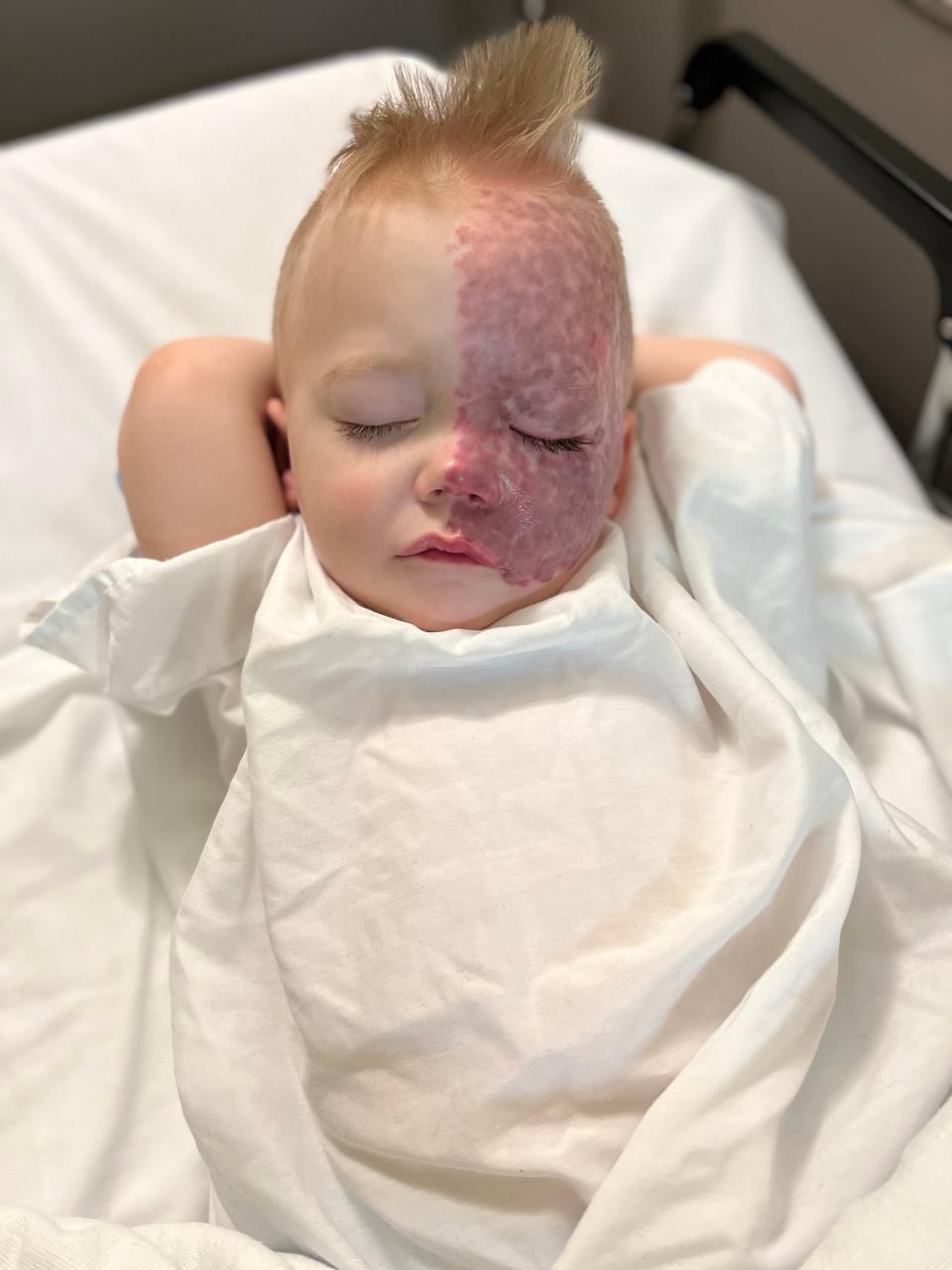Mark of a hero: Columbia County boy helps advance research into rare childhood disorder
- Oops!Something went wrong.Please try again later.
Sturge-Weber syndrome is rare. That’s just part of what makes Tucker Lewis of Harlem a special little boy.
People meeting him for the first time see a charming 4-year-old with two speeds – on and off. Tucker can sit still just long enough to tell you how much he loves the Atlanta Braves before zipping off on another self-declared mini-adventure.
Tucker’s biggest adventure is still unfolding. His treatment for Sturge-Weber syndrome has helped clinicians and researchers learn valuable information about a seldom-studied disorder so rare that only one in 50,000 babies are born with it.
“I want him to know that he different but he’s different because that’s how God made him,” said Megan Lewis, Tucker’s mom. “And he’s got a big story to tell.”
The story starts with a birthmark.
According to some estimates, about 10% of all babies are born with a birthmark. Tucker’s port-wine stain birthmark once covered much of the left half of his face.
“The pregnancy was completely healthy. It’s nondetectable in the womb so it doesn’t show up on a sonogram,” Lewis said. “We got to the hospital, got a C-section, they handed him to me and said, 'Well, we think it’s a bruise, but it could be this.’”
Sturge-Weber was first identified in 1860 but derives its name from the two physicians who provided the first detailed descriptions of the disorder several years later.
For the children: Christ Community Health shows off first pediatric clinic in Augusta
The birthmark’s unusual characteristic is its attachment to the patient’s nervous system. Excessive capillaries cause the birthmark. Abnormal blood vessels on the brain’s surface can cause clots that spur strokes and seizures. Accompanying calcification also can stunt brain activity.
At just 2 weeks old, Tucker was diagnosed with another Sturge-Weber symptom: glaucoma. Threatened with losing his vision, Tucker underwent successful surgery a week later.
Connecting online with other parents of children with Sturge-Weber, Lewis found Dr. Anne Comi, director of the Hunter Nelson Sturge-Weber Center at the Kennedy Krieger Institute, a children’s medical treatment and research nonprofit. Comi has treated Tucker since he was 6 months old, carefully monitoring his progress.

“All of his medical research goes to her to further the pre-symptomatic treatment. That's what she focuses on,” Lewis said. “You don't want to just put your baby in the hands of someone who doesn’t know a lot about it. I wanted someone who studies this, who has lived this and breathes this.”
About 90% of Sturge-Weber patients experience seizures. Tucker’s doctors noted that he never had a seizure. For nearly his entire life, doctors treated Sturge-Weber symptoms in Tucker when the symptoms hadn’t presented themselves.
That turned out to be key in a recent discovery by Kennedy Krieger and research partner Boston Children’s Hospital.
“By treating these infants ahead of time, we can lower those chances of experiencing early seizures by almost half,” Comi said. “In our study group, we reduced the percentage of patients diagnosed with early seizures from 88% to 53% and improved outcome at two years. This breakthrough shows that treating infants before they start showing major symptoms improves their quality of life.”

Tucker’s quality of life is great – just ask him. His friends in Harlem Baptist Church’s pre-Kindergarten program have worn heart-shaped stickers on their cheeks as faux birthmarks in solidarity with Tucker, whose birthmark has faded slightly from 20 laser treatments to more closely resemble a heart. Aspirin discourages blood clots and the anticonvulsant drug Trileptal staves off seizures.
The diminished vision in his left eye just meant that Tucker had to learn how to bat left-handed for his T-ball league. He still throws right, though, just like his favorite Brave, third-baseman Austin Riley. Tucker’s T-ball uniform number is 99, but “I’ve got to get a new jersey,” he said, to match Riley’s No. 27.
Tucker says he wants to be a pro baseball player when he grows up. Or a police officer. Or a crane operator.
“I’m going to do all of them,” he said.
This article originally appeared on Augusta Chronicle: Columbia County boy's rare illness helps doctors on crucial treatment

